FORMER LIBERIA VICE PRESIDENT MOSES BLAH IN THE HAGUE - PORTIONS OF THE SPECIAL
COURT'S OFFICIAL TRANSCRIPT RELATING TO FORMER RUF TOP OPERATIVE SAM "MASKITA"
BOCKARIE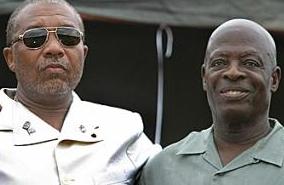
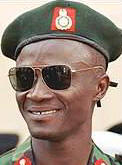
Q.
Just to be clear, this particular visit, this was before or after this meeting
that you had with Taylor?
A. Yes.
Q. Was it before or was it after?
A. No, it was after. It was after, after the meeting, and Sam Bockarie had just
entered Liberia at that time. I think it was about two days or three days.
Q. You said you saw him two times after the meeting.
A. Yes.
Q. Where did you see him the next time?
A. The last time I saw Sam Bockarie was in the evening. I had gone to the farm
again. I think that took about three to four days as somebody died in my town
and I went for the funeral and in that evening I drove from Monrovia to my farm
and it is in the
far distance. I had a hut - not in my big house, I had a hut in my compound and
one of my senior bodyguards came around, I think it was about 10.30 to 11.00 and
he said, "But, chief, we have lots of vehicles passing, lots of people passing.
What is
happening?"
Then I told him to return to double check where the cars were going to and then
when he went outside - and my house was
very close to the road and when he went out he did not stay. In no time he came
back and he said, "Chief, put on your clothes. I saw Benjamin coming into you.
Dress properly."
Then I went in and put on my jacket and my trousers and I came outside. As I
approached the main road Benjamin was almost
at my door and then he said, "How do you do, chief?" I said, "Oh, Ben, where are
you going to?" He said, "We are taking
patrol tonight." At back of the jeep, the jeep where he was in, he dropped down
from the car and the car was coming slowly
towards me. That was when I saw Bockarie. He jumped out of the car. His wife,
Benjamin's wife, and a lady that I cannot name,
those ladies alighted from the car and hurried ladies started calling for seats.
He said, "Chief, bring the seats. There are
visitors here."
Q. Calling for what?
A. Seats. They were calling for some place to sit and then I said, "You should
please come and find seats. You are visitors
here", and usually that was my usual attitude. I was a big man in government and
when I saw the director I said they should take seats. I gave them seats to sit
down. They sat down and this was outside and it was the dry season and there was
good weather at that time. I said, "We can all sit here and converse."
Then they sat down and on the right-hand, or rather left, I saw Sam Bockarie's
wife, who was later introduced to me, and I
saw Benjamin Yeaten's wife, whom I knew very well, and there was a strange girl
too. That was my first time seeing her and she
was also introduced to me. I saw Benjamin and another group of people. The
people I saw in majority were Sierra Leoneans and I
didn't have time because they couldn't speak to me as they were all standing by
their vehicles, but then Benjamin and the other
group got down and I gave them seats they sat down.
Then I said, "I have food, do you want to eat?" Then he said, "Oh, yes, we are
hungry. In fact, we did not eat in Ganta." I said, "Okay, fine." I called my
younger sister, I said, "Look, bring food for Ben and his people to eat", and
then my sister brought rice. He cooked nice cassava leaf to be precise, to be
exact, and everybody brought plates and they started dishing the food.
Then I asked Ben, I said, "Ben, I have cold water." I said, "I have a bottle of
whisky here", and then he said, "Bring that also", and then I asked my security
boy, I said, "Go in and look in my cooler. Don't bring - just bring the big
gallon and the ordinary big bottle." I said, "Please don't bring my liquor here
because if people pass by you will drink the balance." I said, "Please bring my
liquor", and we all laughed over it and he brought the bottle of gin.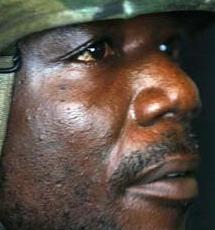 Benjamin was sitting right close to Sam Bockarie and Sam Bockarie had on a
jacket, a military jacket, and with his pistol by his side and what did I notice
next that he had on? He was in a combat fatigue, likewise Benjamin. He was in
military fatigue. He was uniform. He had a pistol and then they went on eating.
They almost - they drank almost half of my liquor. They almost finished it and I
said, "You can take the bottle with you." Then I asked them, "Where are you
travelling to?" They said, "Chief, we are going to my village and from my
village we are turning left and we will go to Kamplay and from Kamplay we will
be coming back to Ganta." I said, "Oh, I wish you good luck", and we laughed
over it and then all of them boarded the vehicles and the convoy started moving.
They were moving. As we were talking I did not know there were a lot of cars
parked on the main road, but we stood there and we saw the lights. It was at
night and we saw the cars passing and passing. For about 20 to 30 minutes cars
were still passing and they all went. When they went, we went back to sleep,
about maybe 1.30, 12 to 1 o'clock, I saw --
Benjamin was sitting right close to Sam Bockarie and Sam Bockarie had on a
jacket, a military jacket, and with his pistol by his side and what did I notice
next that he had on? He was in a combat fatigue, likewise Benjamin. He was in
military fatigue. He was uniform. He had a pistol and then they went on eating.
They almost - they drank almost half of my liquor. They almost finished it and I
said, "You can take the bottle with you." Then I asked them, "Where are you
travelling to?" They said, "Chief, we are going to my village and from my
village we are turning left and we will go to Kamplay and from Kamplay we will
be coming back to Ganta." I said, "Oh, I wish you good luck", and we laughed
over it and then all of them boarded the vehicles and the convoy started moving.
They were moving. As we were talking I did not know there were a lot of cars
parked on the main road, but we stood there and we saw the lights. It was at
night and we saw the cars passing and passing. For about 20 to 30 minutes cars
were still passing and they all went. When they went, we went back to sleep,
about maybe 1.30, 12 to 1 o'clock, I saw --
Q. The question has gone on and we may be approaching the break, but I think we
will pick this up in the afternoon.
A. Okay.
Q. I just have one of these questions about "he" that I want to clarify.
A. Yes.
Q. Who said that they were going on to his village and then to Kamplay?
A. Benjamin Yeaten, sorry, sir. Benjamin Yeaten told me that he was taking
patrol. He did not make mention of Sam Bockarie.
He said that, "We are going. These are my people. We are taking a routine
military patrol and we are passing through my village",
Benjamin's village, and that they will come on to Sanniquellie. That was a bad
road and they will come on to Ganta that night.
He said that was what they were on. I said, "Okay, okay", and we knew at that
time there was war everywhere and that he had rights to patrol everywhere. Then
I said to them, "Okay, I will see you when I come to Ganta", and then they left
that night. They left to go to Benjamin Yeaten's village that night.
**************************************************
MR RAPP: Fine. I think that would
be the break, your Honour.
PRESIDING JUDGE: Yes, indeed, Mr Rapp. It is just after our normal lunchtime
adjourning. Mr Witness, we are going to adjourn for the lunchtime break. We will
start again at 2.30.
THE WITNESS: Your Honour, sir.
PRESIDING JUDGE: Please adjourn court until 2.30.
[Lunch break taken at 1.32 p.m.]
[Upon resuming at 2.30 p.m.]
**************************************************
PRESIDING JUDGE: Mr Rapp, when you are ready to proceed.
MR RAPP: [Microphone not activated] Thank you very much,
your Honours:
Q. Good afternoon, now that the mic is on.
A. Good afternoon.
Q. We have had a request from the interpreters and court reporters to go slower
with the answers and certainly feel free to break up your answers and we will
have follow up questions.
A. Yes, sir.
Q. Witness, when we broke we were talking about you meeting with Yeaten and
Bockarie at your farm. You said you had met in a
particular - did you say you met in a particular room at the farm?
A. It was not in a room. It was in front of my house. It was outside. It was not
in a room. We were seated outside of my house.
Q. And did that place have any location, or have any name? Did that location
have any name?
A. We were in a town called Toweh Town.
Q. I think earlier we had the spelling. It is T-O-W-E-H, right?
A. Yes.
Q. And you said that someone told you where they were going and they were going
to follow this route and I believe you told
me what they said, but would you just repeat. Who told you what their route
would be?
A. Benjamin Yeaten told me that they were on a patrol and that they were taking
another direction on their return. They were
going to Sanniquellie on to Ganta.
Q. I
don't know if we have had a spelling of Sanniquellie, but it is
S-A-N-N-I-Q-U-E-L-L-I-E.
A. You are correct.
Q. But you said they were going first to Yeaten's town. What was the name of
that town?
A. Yeaten is from Butuo Tiaplay.
Q. So Tiaplay is T-I-A-P-L-A-Y, but you used a word or a name in front of
Tiaplay?
A. Tiaplay. The identical for Yeaten's town is Tiaplay. They were going first to
Butuo before going to Tiaplay.
Q. Okay. And Butuo, how is that spelt?
A. B-U-T-U-O, Butuo.
Q. And did they tell you where they were going to spend the night?
A. No, we didn't discuss that. What was said was that they were on patrol and
they were going through Benjamin's home town
on to Sanniquellie and on to Ganta.
Q. When they arrived, did you see what kind of vehicle Bockarie was in?
A. Bockarie was in a jeep, in a Nissan patrol jeep, together with Benjamin, and
there were a lot of vehicles - Toyota Land Cruiser pick-up trucks. There were
other vehicles, other pick-ups, Nissan pick-up trucks. There were a lot of
vehicles, different kinds of vehicles, that Benjamin used and his soldiers.
Q. Now, did he leave in the same vehicle?
A. Yes, they went back into the same vehicle that brought them to my place.
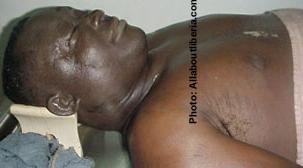
*********************************
A. It
is Saw Mill Camp. Saw Mill Camp. Where people saw logs.
Q. It was a camp?
A. Where they saw lumbers.
Q. Okay, saw mill.
A. Saw mill.
Q. Okay. And someone told you that Benjamin wanted to see you?
A. Yes, he wanted to see me in his car. So when I went into the camp and he
said, "Chief, come here". He was sitting on a
chair outside. He said, "Come, chief". I went to him and he was still sitting
down and he got up and he said, "Oh, chief, I called you. We went on an
operation last night". I asked him what operation it was. He said, "Look in that
pick-up, you will see the operation".
There was a pick-up that was parked not too far from him, but it was parked by
the side of a house and you wouldn't recognise what was in the pick-up except
you went closer. So I went closer with my bodyguard. My bodyguards were anxious
to see what was there even before me, so the other boy - two of my boys first
went and they said, "Oh" and they came back to me.
And I went to the pick-up and I saw the body of Sam Bockarie still dressed as he
was at my house the previous night; the way
he was dressed in that military vest. He was lying on his back. Another body was
beheaded, the head was cut off, the head was
aside the body. And in the same car there were two corpses in that same car. I
saw - when I saw these corpses I turned around
because somebody I had just spoken to, we shared jokes together and you see the
corpse of that person.
And I said, "All right. Attend to Benjamin". I came to him and said, "Ben, is
this the mission that you were on?" He said, "Yes, that's the mission". I said,
"All right, all right. Then I'm going to Monrovia". Then he said, "The pick-up
is going to Monrovia. I am sending the pick-up to chief". As we were talking the
pick-up pulled off. They didn't want to leave us behind or for us to go ahead of
them. They were always ahead. When we passed by them when I attempted to drive
fast they would double their speed to pass by me to go ahead.
Q. Witness, just a moment. You are now on the road passing pick-ups. I just want
to go back and discuss some detail. The second individual who was beheaded,
could you tell whether that was a man or a women?
A. That was a man. That was a man. I didn't see the man when they only stopped
by my house. It could be that this man was a
soldier, he was on duty also. He was a huge fellow. So I couldn't recognise him.
I only saw the corpse and it was beheaded; the head was off. The head was by the
body of the man himself in the same pick-up with Sam Bockarie. As we drove along
--
Q. Just before we deal with that, you said you spoke to Yeaten, Benjamin Yeaten,
about the mission that he was on.
A. Yes.
Q. Did he say anything else?
A. What he said was, "Look in that pick-up and you will know the mission". He
said, "Look in that pick-up truck. You will see the mission that I was on". And
I went and my bodyguards went ahead and they saw it. They called me up I went
and looked and I shook my head and returned to my car. I simply said, "Ben, we
are on or our way to Monrovia". Then he said, "Okay, I am
sending the pick-up back to Monrovia to the chief". I said, "Okay".
Q. He said he was sending the pick-up back to the chief?
A. Yes, to the chief to Monrovia, the pick-up with the corpses inside.
Q. Why was he sending the pick-up to the chief?
A. I don't know. I don't know.
Q. Did he explain to you why he had done this?
A. No, I didn't ask him. I didn't ask him at that particular time. I did not ask
him. And for security reasons it was not necessary for me to ask him.
Q. Did he ever explain to you what had happened?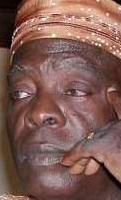
A. He did not in detail. At that moment I did not ask. He only said it was the
mission that he went on and that's the mission in the pick-up. He did not say
anything in detail.
Q. Well, you said he didn't discuss in detail. At any time did he tell you why
he had done this mission?
A. At that particular time, no. At that particular time he did not say and it
took me some time before I could see him. At a later date - I have something
that I can explain so that I won't miss the track.
**************************************************
PRESIDING JUDGE: Sorry, Mr Witness, I didn't quite understand what you said.
Please repeat it. You said you want to explain?
THE WITNESS: Yes. How this thing actually occurred. If you cut me off I will not
be able to keep the connection.
PRESIDING JUDGE: I see. Mr Rapp, will lead you in your evidence.
MR RAPP:
Q. I just want to - I would like to get it clear here. You said not at that
particular time did you discuss it with him. When did you discuss it with him?
A. It was when he came to Monrovia, about a week or two, when he returned to
Monrovia when I asked him he jokingly said, "Look we did that thing to destroy
evidence". It was at that time - it was at that time that I knew that it was Sam
Bockarie's body. He said, "Oh, President Blah, this is an operation. You are
small in it. We want to destroy the evidence. We don't want anything exposed.
The way you were thinking was the wrong way". Then I said, "All right". That was
what I said at the wrong time.
Q. When he said, "The way you were thinking was the wrong way" what was he
referring to by "the way you were thinking"?
A. The consultation that I had with the President Taylor at the time was that he
was to arrest this man and send him over to
Sierra Leone at least to have better face with the Government of Sierra Leone.
That was the way I was thinking. To have him
arrested and send him over to the Government of Sierra Leone. That was what I
thought. But the thought of killing him to
destroy evidence was not my thought. I never thought of that. I think that was
what he was referring to.
Q. You used the word - I think I have to get it exactly from the record, but I
think you said, "Because we'd be exposed". I think words to that effect.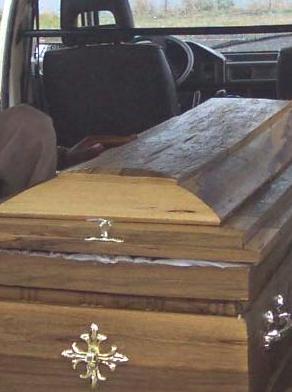
A. NPFL government or Charles Taylor's government will be exposed.
Q. Exposed. What would be exposed?
A. Whatever secrets they may have had with the links with RUF and the government
of Charles Taylor, that he was supporting the government, that he was supporting
those fighting in Sierra Leone. These were things that were not supposed to be
exposed
from my own analysis.
Q. But this word "exposed", who used that word?
A. Well, Benjamin.
Q. Now let's go back to the highway. You said you drove from there. Where did
you go?
A. I was on my way to Monrovia.
Q. And did you reach Monrovia?
A. Yes, I got to Monrovia and when I reached there I went into my house. As soon
as I got to my gate - as soon as I got to my
gate I saw my little daughter and they said the girl was in school and the car
did not go to pick her up. What I did was to go to the school and say, "You have
to wait for me because I want to go and see the President on some serious matter
before I come
to take you to go home". She waited and I drove directly to White Flower at the
time. When I got to White Flower I went in and asked the security man at the
gate whether the chief was there, whether the President was there. He told me to
wait out for a while. He went to see him and he said, "Okay, you can come in".
When I went inside then I said - I saluted him and I said, "Chief,
Benjamin passed by my village last night and when I came back on the main road I
saw the corpse of Sam Bockarie and another corpse in the car". That was when he
told me, "No, that is not your business, it is a military operation. I only
would like to hear
it from a military people and not from you". That was how that conversation
ended and I came back to my pick-up and went back to take my daughter from
school.
Q. Who told you - I just want to be clear. You were using "he" there, he said
this was a military operation?
A. The President Taylor. He told me it was a military operation, that it was
none of my business as Vice-president of my country. That was when I left and
went and took my daughter back home and I told my people who were supposed to go
around me,
who did not go with me to Toweh Town, I called them and told them this is what I
saw, this is what happened on our way from Toweh Town. I like talking, I like
conversing with other people I have working with me.

